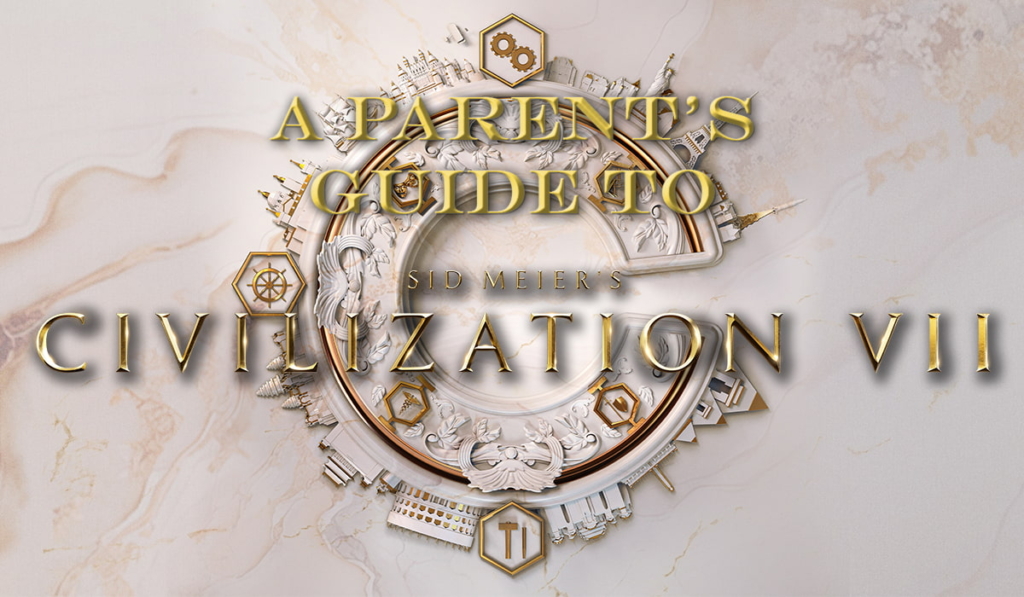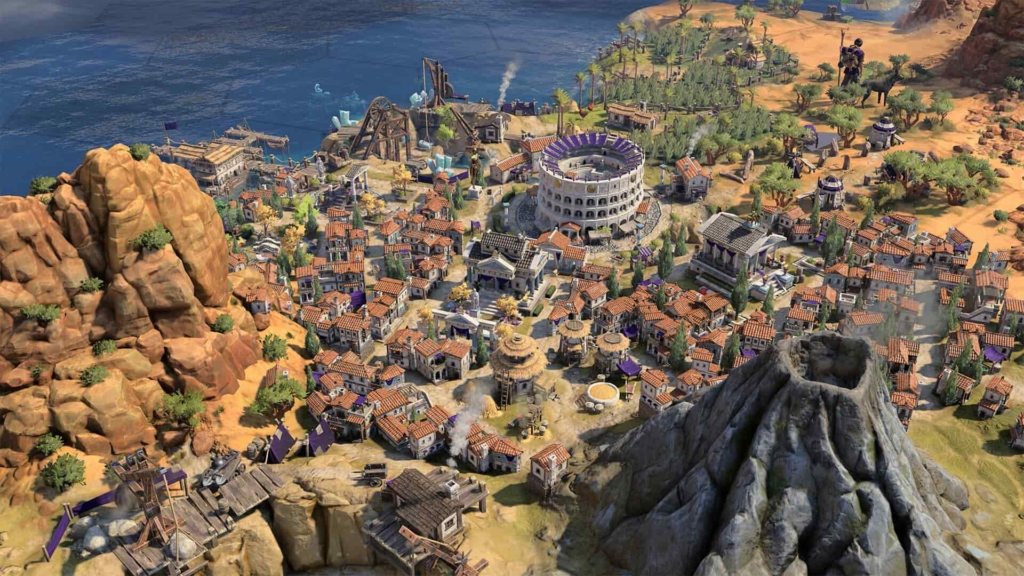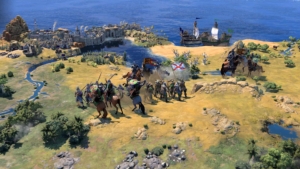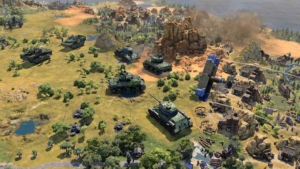A Parent’s Guide to Sid Meier’s Civilization VII

ESRB often talks about how (when managed appropriately) video games are forces of growth and learning for people of all ages. I almost always cite Sid Meier’s Civilization series as a clear example of this. Civilization VII is a turn-based strategy game where the player manages their own empire spanning human history. That is the simple version.
The complicated version is that players are charged with putting themselves in the shoes of a famous world leader to manage their society’s growth, civics, economics, diplomatic relationships, technological development, and more.
While this can be a complex balance, Civilization secretly teaches players a lot about the real world. Sid Meier’s Civilization VII is the latest in the long-running franchise, initially released in 1991. But is it appropriate for your whole family? We have everything you need to know to decide!
Is Sid Meier’s Civilization VII Appropriate for Kids?
Sid Meier’s Civilization VII is rated E10+ for Everyone 10+, with Content Descriptors including Alcohol and Tobacco Reference, Mild Language, Mild Violence, and Suggestive Themes. The rating also includes Interactive Elements for Users Interact and In-Game Purchases.
According to the ESRB Rating Summary, “players can use ranged attacks (e.g., arrows, guns, catapults, bombs) on opposing forces. Combat is highlighted by impact sounds, gunfire, and cries of pain.” Additionally, “The text sometimes references suggestive material…” and “controlled substances.”
You can visit the ESRB rating page for Sid Meier’s Civilization VII to read the full Rating Summary.
Where Can I Play Sid Meier’s Civilization VII and How Much Does It Cost?
Sid Meier’s Civilization VII is available on Linux, Macintosh, Windows PC, PlayStation 4, PlayStation 5, Nintendo Switch, Xbox One, Xbox Series X|S. There are several editions of the game with slightly different offerings:
- Standard Edition – $69.99 and includes the base game.
- Deluxe Edition – $99.99 and includes the base game, as well as post launch content and a “Deluxe Content Pack” with additional content at launch.
- Founders Edition – $129.99 and includes everything from the Deluxe Edition, as well as an additional “Founder’s Content Pack”.

The Standard Edition includes the full game, and the other two editions do not materially change the core experience. Still, if you’re interested in looking into each edition in more detail to see which is the best fit for your family you can do so at the Civilization website.
As mentioned in the rating, Civilization VII also includes the ability to purchase additional content with real-world currency. Remember that this is not a requirement; you can fully enjoy the game without purchasing additional items.
What is Sid Meier’s Civilization VII About?
Civilization is about… well, building a civilization! This includes having to make many of the decisions that world leaders may have had to make throughout time – like whether to invest in militaristic might, scholarly pursuits, technological innovation, or any number of valuable historical anchors. Players will make literally all these decisions and forge a story as their empire slides through time.
How Does Sid Meier’s Civilization VII Play?
Civilization is a series with a tremendous amount of depth, offering a lot in terms of individual choice, strategic thinking, and even unintentional learning. But at its most basic, Civilization can be boiled down to a game of gathering resources and making decisions about what to do with said resources. The yields at your disposal dictate everything that one can do with their settlements in Civilization VII. And you are in control of which resources to gather, which to forgo, and how to balance that against your civilization’s needs.
Before starting a campaign in Civilization VII, you’ll pick a “Leader” and a “Civilization”.
Leaders are embodied by historical giants, like Benjamin Franklin, Confucius, Machiavelli, and (many) more. Each Leader has their own permanent bonuses that follow the player through the campaign. For example, choosing Benjamin Franklin will give players a leg up on their scientific pursuits. Meanwhile, choosing a leader like Machiavelli will provide additional influence, allowing for more options when managing diplomatic negotiations with other empires.
Civilization can be boiled down to a game of gathering resources and making decisions about what to do with said resources.
Picking a Civilization dictates which society players begin the game as, such as Egypt, Rome, Greece, Han China, etc. Each unique civilization has different bonuses and visual styles. This includes unique buildings and layouts for some districts depending upon how to choose to organize and build up your chosen Civilization.
Once you have a Leader and a starting Civilization, the real choices begin. Campaigns in Civilization VII start in 4000 BC, where players can establish a capital city in the “Age of Antiquity”. After founding a capital, you’ll have control over virtually every aspect of your budding empire’s growth, including exploration, policy, research (technological and civic), international diplomacy, faith, trade, and more. Starting by picking a location for your capital on the board-game-like hexagonal array of spaces, you’ll then determine how to best expand based on the geological features surrounding the site and the readily available resources.

Every turn, you will decide what to do with your settlement, and eventually, all your units (scouts, warriors, knights, etc.). Some decisions – like building a new district or recruiting new units – may take several turns, depending upon what the settlement in question can produce. When your turn is over it’s time for the computer to take its turn. Unless, of course, you choose to play online against other human players vying for the same land and resources as you!
As you can imagine, the web of strategic management swells exponentially depending upon how you choose to govern. You’ll gain more resources, units, settlers, and with the flexibility to establish urban or rural districts, and how to align those districts depending upon your goals.
Eventually you’ll reach the end of the Age of Antiquity, which is punctuated by an in-game “crisis” that you need to manage. For example, your world may be met with a series of events leading to a plague over many in-game years. This crisis will provide you with the opportunity to enact new policies to overcome the crisis, such as an increased focus on medical aid. The way you manage these crises factor into how your civilization will evolve as you move into the next era: The Exploration Age. Upon the completion of every Age, you will choose a new civilization that reflects that time, aligning your ongoing empire with a more period-appropriate society. The same can be said for when you transition from Exploration into The Modern Age. Depending upon how players progress, they can start as Egypt and end up as America or have a wildly different experience.
Now… how do you win a campaign in Civilization VII? Like everything in Civilization there are a few paths that dictate victory. Throughout the campaign you’ll see four Legacy Paths: Economic, Military, Science, and Culture. You will accumulate points for these paths as you progress by completing specific tasks – all of which can contribute to four possible victories in the Modern Age: Cultural, Economic, Military, and Scientific.
 For example, you may get points toward the Military victory by conquering or destroying other empires. Meanwhile, you may earn points for a Science victory by researching flight and space travel in the modern age. You are also empowered to pursue and achieve points for multiple victory types throughout all three ages.
For example, you may get points toward the Military victory by conquering or destroying other empires. Meanwhile, you may earn points for a Science victory by researching flight and space travel in the modern age. You are also empowered to pursue and achieve points for multiple victory types throughout all three ages.
Truth be told, the above just scratches the surface. But with so much of Civilization VII being anchored in history, your family can learn a lot about where we all come from. Each and every leader, civilization, topic of research, unit, building, district (and more!) is accompanied by text explaining its historical significance in context. According to developer of Civilization VII, Firaxis Games, the visuals were even inspired by museum dioramas. This dedication is reflected by the game’s thorough inclusion of real historical facts.
Managing Appropriate Experiences for Your Young Rulers in Sid Meier’s Civilization VII
While the content of Civilization VII may be appropriate for most 10-year-olds, that does not necessarily mean that the game is targeted at them. Civilization is a very complex series, and while it is educational, the barrier to entry may be too great for some younger aspiring rulers. However, Civilization VII can be a great family experience to enjoy together. According to our recent research, 75% of parents regularly play games with their kids. Sitting as a family and deciding together how to proceed with your empire can be an educational and exciting bonding experience to share!
If your young emperors and empresses are ready to rule solo, remember to set parental controls on their video game devices to manage with whom they can play online and whether they can make in-game purchases. Civilization veterans also highlight how “just one more turn,” can soon morph into many, many more turns. Parental controls also allow you to manage when and for how long your kids can play games. While you’re there, you can also set controls to limit or block which games they can play based on the assigned rating information and block/limit purchases of new video games. You can find step-by-step parental control guides at ParentalTools.org.
And if you’re looking for more tips to help you create positive and appropriate video game experiences for your kids, visit our Family Gaming Guide.




